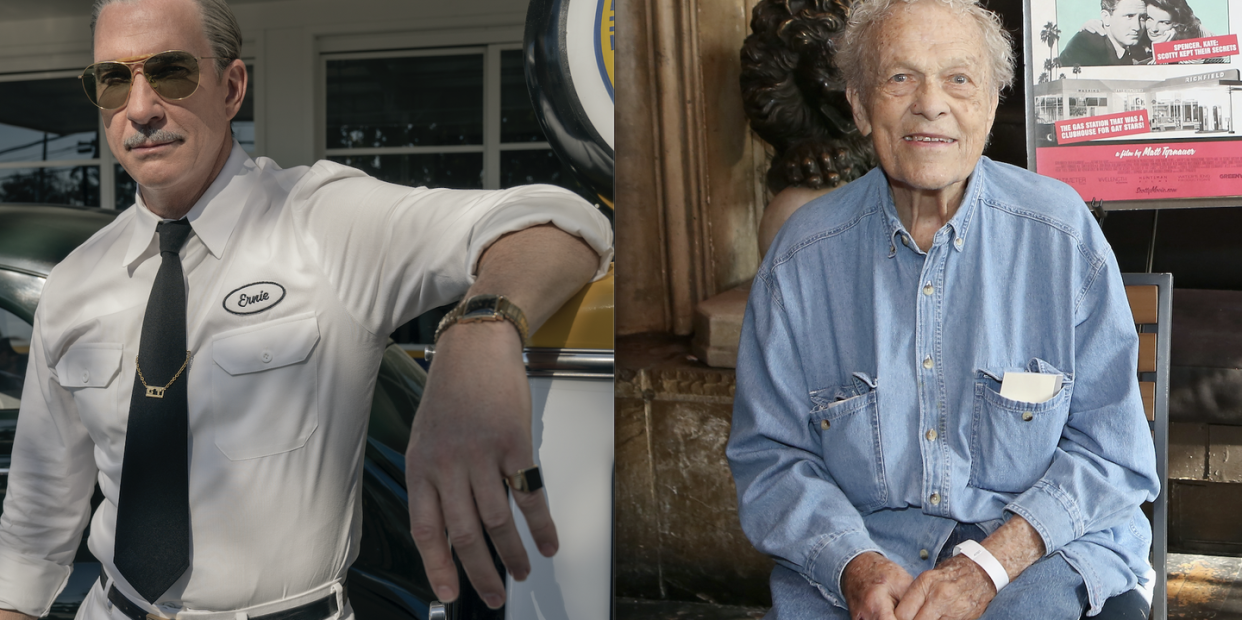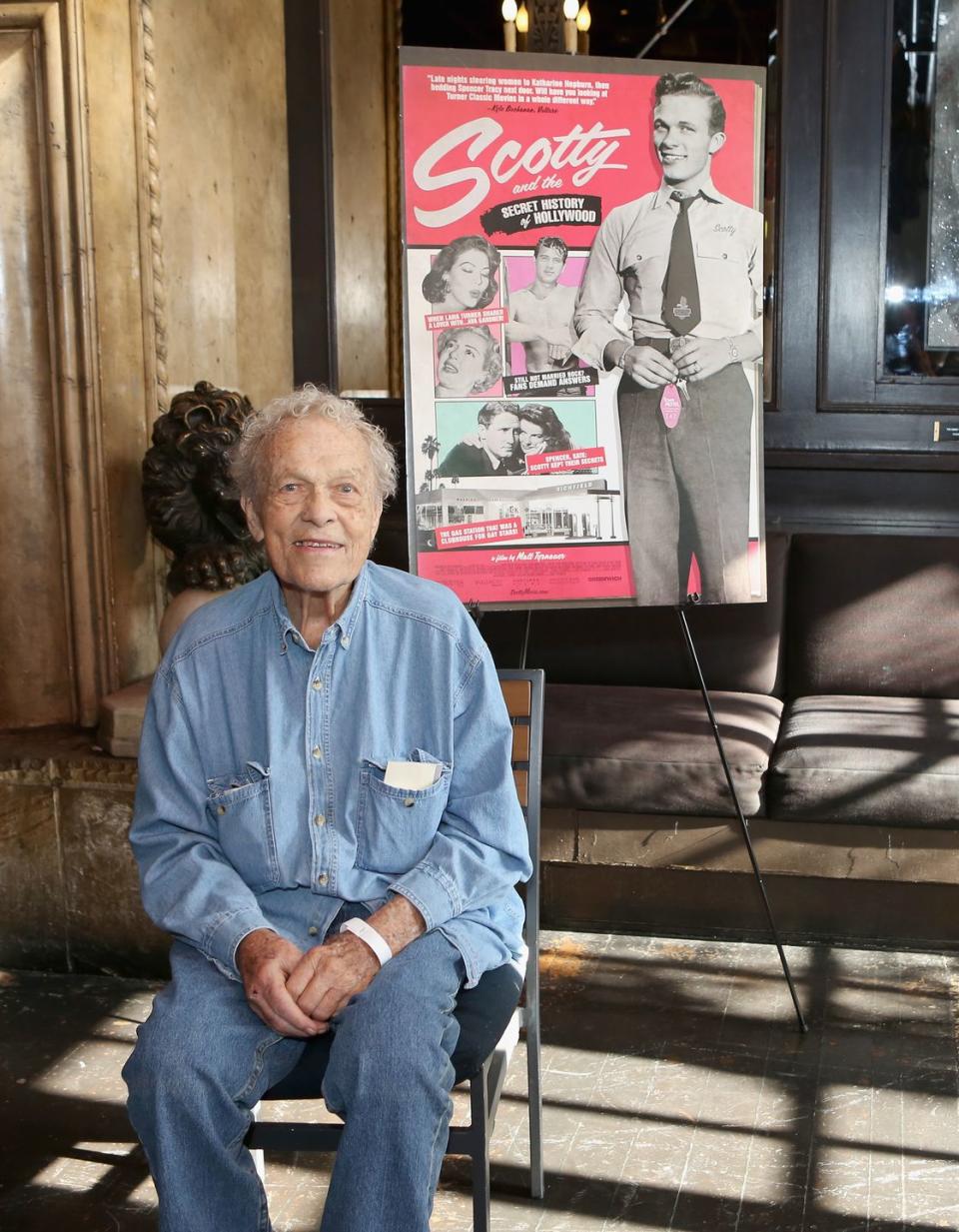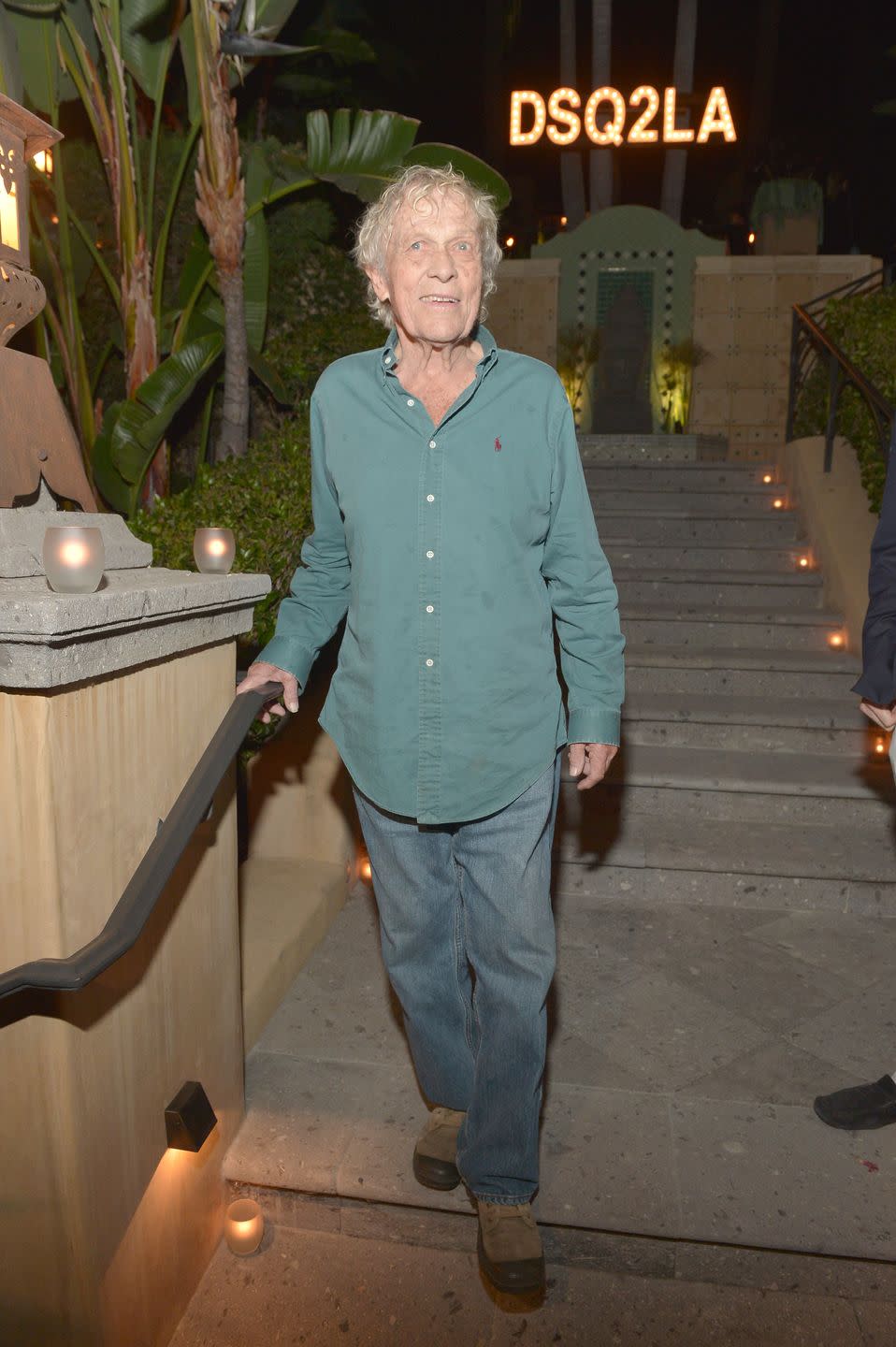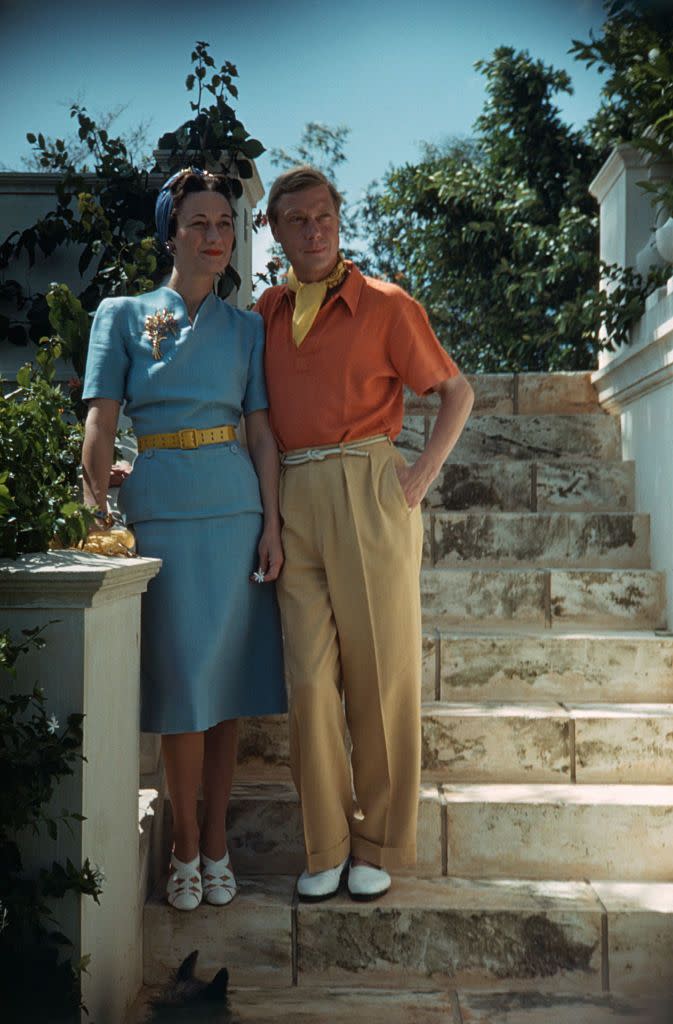The Gas Station Pimp in 'Hollywood' Is Inspired By the Real 'Gentleman Hustler' Scotty Bowers


Ryan Murphy’s Hollywood traces the rise of fictional World War II vet Jack Costello as he navigates an alternate-reality tinseltown populated with a mixture of real-life figures and fictional creations. But without Ernie, played by Dylan McDermott, Jack’s rise would never have been possible. In the series, Ernie hires Jack to work at his gas station, which serves as a front for his true business, operating as a pimp for the Hollywood elite. As a sex worker, Jack meets influential industry figures who help him land his first onscreen roles. Jack and Ernie are both fictional characters, but both their stories bear similarities to the unproven but scandalous biography of a real-life man: former Marine and Hollywood pimp Scotty Bowers.
In 2012, Bowers released a tell-all memoir about his years as what he called a “gentleman hustler,” arranging sex for some of the most famous figures of Hollywood’s golden age, and was later the subject of the documentary Scotty and the Secret History of Hollywood. And for a time, he really did run his operation out of a Los Angeles gas station. Here’s what you should know.
Who was Scotty Bowers?
Bowers was born George Albert Bowers in 1923 to an Illinois farming family. When he was ten, his parents divorced, and he moved with his mother and siblings to Chicago. His early years were marked by poverty and sexual abuse, and while still a child he worked as newspaper deliverer, shoe shine boy, and prostitute to support his family through the Great Depression.

At 18, he entered the Marines during World War II, and served in the Pacific alongside his older brother, Don. They fought at Iwo Jima, and Don was killed in action. The horrors of war left Bowers determined to enjoy life, and after the war ended he moved to L.A. with a young woman named Betty Keller, who would become his common-law wife.
Once in the city, he found work at the now-defunct Richfield gas station on 5777 Hollywood Boulevard. According to his biography, the first time he sold sex from the station occurred when he was picked up by Walter Pidgeon, the Academy-Award nominated star of films like Mrs. Miniver and How Green Was My Valley.
Word spread about his discretion as a sex worker, particularly within Hollywood’s gay community. Bowers recruited other young men and women, including some of his buddies from the Marines, to work alongside him, selling sex out of a trailer parked in the back of the gas station and at a motel across the street. Tricks were turned in the station’s bathroom, and thanks to a peephole in the wall, Bowers earned money from voyeurs, too.

At the gas station, he supposedly met George Cukor, director of movies including A Star Is Born and My Fair Lady. He was gay, and famed for parties that attracted other closeted film industry figures and were filled with handsome young men. (In Hollywood, Cukor is played by Daniel London, and episode “Outlaws” portrays one of his famous parties.) The director introduced Bowers to stars like Katherine Hepburn, and helped him earn the trust of some of the biggest names in show business.
Hays Code era films were mandated not to “lower the moral standards” of viewers, and movie studios demanded that their stars have reputations as squeaky clean as the movies they made. Performers’ contracts included morality clauses, which meant that if news of gay or bisexual actors personal lives became public, it could mean the end of their careers. Meanwhile, vice squads regularly raided gay bars, while the tabloid magazine Confidential deployed armies of informants in its attempts to out stars. For many famed actors, Bowers offered a valuable service, a way in which to pursue sexual relationships while minimizing the risk to their careers.

Which stars were among his clients?
Bowers' memoir Full Service is full deeply graphic and nearly impossible to verify stories about the sex lives of stars, from legends who are still household names, like Hepuburn and her longtime partner Spencer Tracy, to once famous but now less well-known figures like Charles Laughton.
Bowers writes that Tracy and Hepburn’s partnership was one of convenience, and that both were bisexual or gay. He said that he slept with Tracy on many occasions, and arranged for Hepburn to have sex with around 150 women over the course of their nearly 50-year friendship. Bowers describes a similar relationship with the Duke and Duchess of Windsor, the former King of the United Kingdom Edward III and his wife Wallis Simpson, the American divorcée he abdicated the throne to marry. Bowers says he slept with the Duke, procured women for the Duchess, and engaged in group sex with them both.
He told of trysts with Gone With the Wind’s Vivien Leigh (a similar affair between Ernie and the actress is depicted in Hollywood) and Vincent Price, a threesome with Lana Turner and Ava Gardner, and writes in his biography of sleeping with and/or arranging sex for 20th century notables from Edith Piaf to Cole Porter to J. Edgar Hoover to Cary Grant. According to him, Lucille Ball once found him at a party and slapped him in the face after learning he’d procured women for her husband, Desi Arnaz.

At another gathering, he met sexual researcher Alfred Kinsey, and offered to assist in his work. Bowers wrote that he found young women who had sex with each other on camera for Kinsey’s 1953 book Sexual Behavior in the Human Female. He also described bringing Kinsey to an orgy at the home of famed writer Somerset Maugham.
Were his stories true?
Much like Jack in Hollywood’s early episode, Bowers maintained a family life while working at the gas station after the war, and Betty gave birth to their daughter, Donna in 1947. He began a second career as a bartender after Grant asked him to serve drinks at one of his parties. Later, he quit working at the gas station and made bartending his primary legitimate job. In 1970, just three years before the Supreme Court declared abortion legal across the United States, Donna died after undergoing a botched termination.
During the AIDS crisis, Bowers decided to stop arranging encounters for others. In 1984, he married speech therapist Lois Broad, while continuing to see Betty until her death in 2008. He died in 2019, at the age of 96.
It’s hard to verify the tales he told in Full Service, because Bowers carefully wrote only about the dead. Some of the stories—like his account of hooking Kinsey up with pornography from the King of Egypt’s vast personal collection, or that Tennessee Williams wrote and obligingly never published his biography—are pretty incredible. And some of his tales have sparked controversy and dispute, especially those about Hepburn and Tracy, one of Hollywood’s most famous romances.
But Matt Tyrnauer, the former reporter for Vanity Fair who directed The Secret History of Hollywood, told the Washington Post that he found “anecdotal confirmation for almost everything” Bowers said in the film, which features other former sex workers who backed up his claims. Tyrnauer found that Bowers could describe homes and swimming pools that were verified via photograph, while famed gossip columnist and longtime friend of Katherine Hepburn, Liz Smith, substantiated rumors that the star was a lesbian. Writer Gore Vidal, who met Bowers at the Richfield gas station and remained friends with him for decades, vouched for his accounts.
Bowers maintained that, despite the fact that he arranged thousands of encounters over the years, he never took money from sex work that he didn’t personally perform. “Even though I’ve been a bartender, caterer, waiter, handyman, general repairman, and, at the start of my career, a gas station attendant,” he wrote in Full Service, “most of what I did for six decades was to keep people happy.”
You Might Also Like

